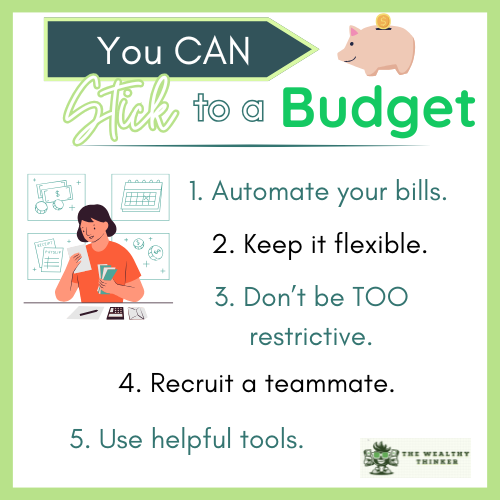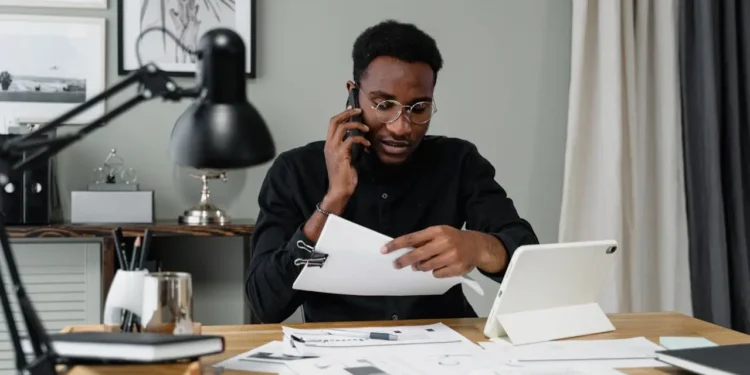To stick to a budget can feel like an uphill battle, especially when life gets messy or your expenses always seem to outpace your income.
But here’s the good news: you don’t have to feel overwhelmed or restricted by budgeting. In fact, with the right strategies, it can be a tool that brings you clarity, control, and even freedom to your finances.
Whether you’ve struggled with budgets before or are starting fresh, this time of year is the perfect time to take charge.
Imagine what it would feel like to:
- stay on track with your money goals
- save for what truly matters
- finally break free from financial stress
In this article, we’ll share seven practical strategies to help you make budgeting not just manageable but effective – and tailored to your lifestyle and financial situation.
These tips will show you how to create a budget that adapts to change, fits your needs, and keeps you moving toward your financial dreams.
Let’s make 2025 the year you finally stick to a budget and take control of your finances!
Understanding that your budget is constantly evolving to fit your needs can help you have more compassion for yourself to stick one.

Seven Strategies to Help You Finally Stick to a Budget in 2025
1. Automate monthly bills.
One of the easiest ways to successfully keep a budget is to automate as many payments as possible.
For example, you can automate your rent or mortgage, utilities like electricity and internet, as well as any debt payments. This will help you to know exactly how much you spend every month on these reoccurring bills and have a simple budget line for automatic payments.
You will no longer have to worry about remembering to pay these bills or worry about the consequences of being late, paying fees or missing payment entirely. Instead, you can use this energy to focus on other things in life that need more attention.
2. A budget is always changing.
One thing to remind yourself is that, just like life, a budget is constantly changing.
Your budget will never be the same year to year and even possibly month to month. Understanding that your budget is constantly evolving to fit your needs can help you have more compassion for yourself to stick one.
For example, you may be renting right now, but you may purchase a home in a few months, and your budget will look different from those months.
3. A budget doesn’t have to be restrictive.
People often fail to have a budget because it is too restrictive. A budget doesn’t have to be restrictive if you don’t want it to be.
Some people do really well when they dedicate every dollar to something very specific. Others don’t like the strict nature of a budget.
If you fall into the second group, have a budget that allows you to pay your bills, have money for saving, and the rest to be used on whatever you want.
This way, you’re still budgeting – you just have one that fits your needs from month to month. The point is to have a plan and stay on track – not to limit yourself to the point of resentment.
It’s the same as when you’re trying to lose weight. If you restrict your calories or treats too much, you’ll be starving and annoyed and eventually break to binge on that bag of chips you didn’t really want, but had to have something other than celery.
4. A budget can work for anyone.
Many people who freelance or work on commission feel like they can’t budget. This isn’t the case.
A budget can work for anyone, even if you don’t have a regular, steady income. If your income changes from month to month, you can still budget, but it may look different than a traditional budget.
Build your budget on percentages of your paycheck instead of a fixed amount. You’ll have to look over your budget every month and make sure you have enough to pay your bills, but this is when having an emergency fund comes in handy.
7 Smart Things You Should Do to Budget on an Unstable Income
5. Make it a habit.
Making a budget should become a habit that you make every month.
It can be at the beginning or the end of the month, but keep it constant. This is a good way to reflect on the previous month, make any adjustments (because budgets are always changing), and set up your next month’s budget.
This will help you stay on track with your finances and successfully keep a budget if you make it a habit.
6. Teamwork is the best strategy.
Have someone to help you stick to a budget. This can be a family member, partner, or even a friend.
This will keep you accountable and also help keep someone else accountable to you. If you’re in a relationship with a partner or spouse, then doing a budget together can keep you both financially aligned.
Oftentimes a budget doesn’t stick because not everyone in a household is on the same page about their finances. If you work on a budget together, then everyone will know how where they can and cannot spend.
Again, it’s similar to when you’re trying to eat healthier or go to the gym more often. If your partner is eating ice cream and playing video games on the couch while you scarf down a salad and grab your runners after work, it’s going to be harder to stick to your new habit.
7. Tracking tools can make budgeting easy.
Budgeting doesn’t have to be hard or something you write out by hand. Use tools like Excel, Karma, or budgeting apps to keep a budget.
These online resources can help you be organized and make the actual process of making a budget easier. In addition, you can use these tools as a way to track your spending, which can help you make the most accurate budget.
You Can Stick to a Budget
Use all or a combination of these seven strategies to help you stick to a budget this year.
Find what works for you, and once you’ve been able to stick to a budget for a few months, you know you’ll be able to keep it up. A budget is a basic financial skill to use because as things come up in life, you can reassess your finances and redo your finances.
Your budget in your 20s and your 50s will look very different, but the principle behind a budget will always stay the same.
Editor’s note: This article was originally published Dec 7, 2022 and has been updated to improve reader experience.


















